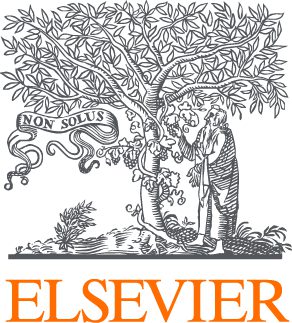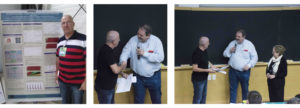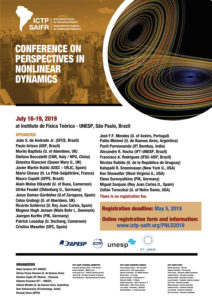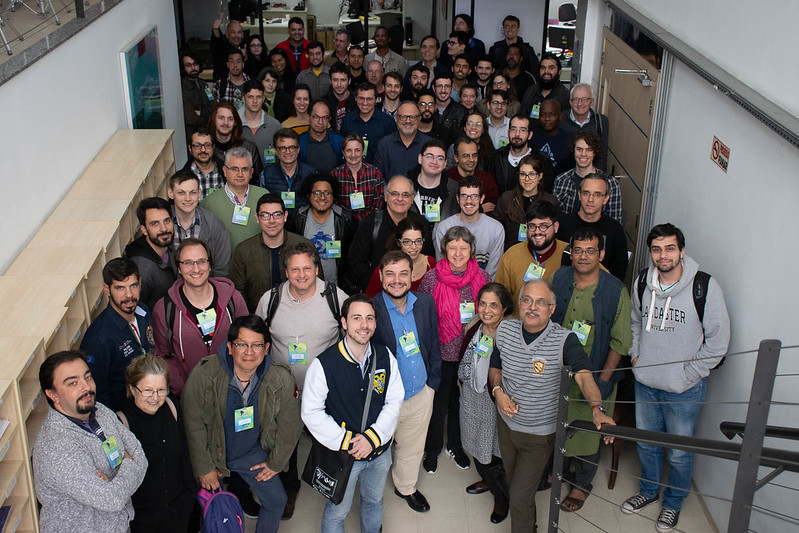Conference on Perspectives in Nonlinear Dynamics
July 16-19, 2019
ICTP-SAIFR, São Paulo, Brazil
Auditorium of IFT-UNESP
Home
The Conference Perspectives in Nonlinear Dynamics PNLD 2019 will be held between 16 and 19 July 2019 at ICTP-SAIFR, São Paulo, Brazil.
PNLD 2019 will be a satellite to STATPHYS 27 which is being held from 8-12 July 2019 in Buenos Aires, Argentina in the preceding week. The PNLD series of meetings have been held as satellites to the STATPHYS conferences since 2004, and thus this will be the fifth in the series.
Our main aim in having this meeting in São Paulo would be to focus on the open issues in Nonlinear science and to identify the directions in which the field is evolving. A second aim of the meeting is to bring together physicists working in the region and across the developing world.
Topics for discussion that have been identified are
- Recent developments in nonlinear dynamical systems (conservative and dissipative dynamics, noise and stochastic effects)
- Spatiotemporal order and chaos
- Synchronization, Control of Chaos and Communication
- Nonlinearity in biological, socio-economic and technological systems
- Dynamics on Networks and Multiplex networks
- Ergodicity, mixing, turbulence and transport in passive scalar and active reacting flows
- Computational Neuroscience
- Climate dynamics
- Social Networks, Urban computing
Conference proceedings: HERE
Organizers:
- Hilda Cerdeira (ICTP-IFT-UNESP, Brazil)
- Silvina Ponce Dawson (Universidad de Buenos Aires, Argentina)
- Neelima Gupte (IIT Madras, Chennai, India)
- Roberto Kraenkel (IFT – UNESP, Brazil)
- Gabriel Mindlin (Universidad de Buenos Aires, Argentina)
- Ram Ramaswamy (Indian Institute of Technology- Delhi, India)
- Ricardo Viana (UFPR, Brazil)
International Advisory Committee:
- Javier Martín Buldú (Complex Systems Group & GISC – URJC, Spain)
- Mauro Copelli (UFPE, Brazil)
- Celso Grebogi (University of Aberdeen, UK)
- Mogens Hogh Jensen (Niels Bohr Institute, Denmark)
- Kunihiko Kaneko (University of Tokyo, Japan)
- Jürgen Kurths (Potsdam Institute for Climate Impact Research, Germany)
- Muthusamy Lakshmanan (Bharathidasan University, India)
- Cristina Masoller (Universitat Politècnica de Catalunya, Spain)
- Lou Pecora (Naval Research Laboratory, USA)
- Sudeshna Sinha (Indian Institute of Science and Education & Research Mohali – IISER, India)
- Rajarshi Roy (University of Maryland, USA)
- Bosiljka Tadic (Jozef Stefan Institute – Ljubljana, Slovenia)
Elsevier Prize to the Best Poster
The organizers of the Conference on Perspectives in Nonlinear Dynamics recognize the importance for young scientists with outstanding work to be publicly recognized. Thus, and funded by Elsevier through the Journal on Chaos, Solitons and Fractas, the prize to the best poster was presented by Professor Stefano Boccaletti to José Trobia for his work on: “Mathematical model of brain tumour growth with drug resistance”.
Confirmed speakers
List of abstracts: PDF updated on July 16, 2019
- José S. de Andrade Jr. (Universidade Federal do Ceará, Brazil): Self-organization and Nonuniversal Anomalous Scaling in Non-Newtonian Turbulence
- Raul P. Aristides (UFPR, Brazil): Non-local coupling among oscillators mediated by fast travelling waves
- Paulo Artaxo (USP, Brazil): Scientific challenges in regional and global climate change
- Murilo Baptista (University of Aberdeen, UK): Exploiting the spatial signatures of causality to understand social crisis in Brazil
- Ginestra Bianconi (Queen Mary University, UK): Emergent Hyperbolic Network Geometry and Frustrated Synchronization
- Bruno R.R. Boaretto (UFPR, Brazil): Protocol for suppression of phase synchronization in Hodgkin-Huxley-type networks
- Stefano Boccaletti (CNR, Italy / Northwestern Polytechnical University, China): Collective organization of networked phase oscillators: explosive synchronization and Bellerophon states
- Fernando S. Borges (UFABC,Brazil): Firing patterns in networks of adaptive exponential integrate-and-fire neuron model
- Roberto C. Budzinski Neto (UFPR, Brazil): Phase synchronization and intermittent behavior in healthy and Alzheimer affected human brain based neural network
- Javier Martín Buldú (Complex Systems Group & GISC – URJC, Spain): Connecting Networks
- Iberê Luiz Caldas (IFUSP, Brazil): Shearless Invariants in Non twist Symplectic Maps
- Ricardo E. Carvalho (UNESP-RC, Brazil): Transport barrieres with shearless atractors
- Mario Chavez (Hôpital de La Pitié-Salpêtrière, France): Ordering and ranking of complex high-dimensional data
- Americo B. Cunha Jr. (UERJ,Brazil): Bifurcation analysis and control of chaos on bistable piezoelectric energyharvesting systems
- Nivedita Deo (University of Delhi, India): Evolution and Dynamics of World Currency Network
- José L. H. Diestra (ICTP-SAIFR/IFT-UNESP, Brazil): Estimation of dengue’s burden in Venezuela using neighboring and internet-source data.
- Bruno Eckhardt (Philipps-Universitaet Marburg, Germany): Individual and collective bacterial motions
- Fabiano Ferrari (Universidade Federal dos Vales do Jequitinhonha e Mucuri, Brazil): Suppression of Synchronization due to Delayed Feedback Signals in Neural Networks
- Silvio C. Ferreira Jr. (Universidade Federal de Viçosa, Brazil): Quantifying echo chamber effects in information spreading over political communication networks
- Ulrike Feudel (Oldenburg University, Germany): Transient chaos in networked systems: Desynchronization and real-time vulnerability
- Neelima Gupte (IIT Madras, Chennai, India): Microtransitions in hierarchical and Climate networks
- André Gusso (Universidade Federal Fluminense, Brazil): Robust chaos induced by two-frequency excitation
- Ricardo Gutiérrez (Universidad Rey Juan Carlos, Spain): Targeting the dynamics of ecological networks
- Kelly Iarosz (USP, Brazil): Mathematical model of brain tumour
- Babatunde Idowu (Lagos State University – Ojo, Nigeria): A New Chaotic Finance System: Its Analysis, Control and Synchronization
- Jürgen Kurths (Potsdam Institute for Climate Impact Research, Germany): Complex network approach reveals global pattern of extreme-rainfall teleconnection
- Emanuel F. Lima (UFSCar, Brazil): Non-chaotic classical transitions
- Alejandro López-Castillo (UFSCar, Brazil): Turing Patterns Modulation by Chemical Gradient
- Ricardo López-Ruiz (University of Zaragoza, Spain): Inequality in Random Markets
- Cristina Masoller (Universitat Politècnica de Catalunya, Spain): Network-based tools for retina image classification and outlier detection
- Ricardo Martinez-Garcia (Princeton University): Pattern formation in populations with density-dependent movement and two interaction scales
- Pablo Mininni (Universidad de Buenos Aires, Argentina): Low dimensional dynamics and invariant manifolds in stratified turbulence
- Adilson Motter (Northwestern University, USA): Symmetric States Requiring System Asymmetry: The Emergent Role ofHeterogeneity in Network Dynamics
- Tiago Pereira (ICMC-USP São Carlos, Brazil): Stochastically driven hubs induce coherence resonance and synchronisation
- Pedro Pessoa (University at Albany/ State University of New York, USA): Entropic Dynamics on Statistical Manifolds
- Samriddhi Sankar Ray (International Center for Theoretical Sciences, Tata Institute of Fundamental Research, India): Non-intermittent Turbulence: Lagrangian Chaos and Irreversibility
- Alexandre R. Rocha (IFT-UNESP, Brazil): Properties of Liquid water from atomistic simulations and neural networks
- Camilo Rodrigues Neto (EACH-USP, Brazil): Model for laws of scale in urban systems
- Francisco A. Rodrigues (IFSC-USP, Brazil): Structure and dynamics of networks: a machine learning approach
- Kalel L. Rossi (UFPR, Brazil): Effects of neural variability on the phase synchronization of neural networks
- Nicolás Rubido (Universidad de la República de Uruguay): What topological factors affect network inference?
- Elena Surovyatkina (Potsdam Institute for Climate Impact Research (PIK), Germany): Forecasting monsoon: insight from Nonlinear dynamics
- Zoltán Toroczkai (University of Notre Dame, USA): Computational Hardness as Chaos in an Analog Approach to Boolean Satisfiability Problems
- Ricardo Viana (UFPR, Brazil): Fractal structures in open Hamiltonian systems: examples in Plasma Physics
Poster
Photos
Videos & Files
Conference on Perspectives in Nonlinear Dynamics
Conference on Perspectives in Nonlinear Dynamics #Day 1 (1 of 4)
- Jürgen Kurths (Potsdam Institute for Climate Impact Research, Germany): Complex network approach reveals global pattern of extreme-rainfall teleconnection
- Ricardo Martinez-Garcia (Princeton University): Pattern formation in populations with density-dependent movement and two interaction scales
- Iberê Luiz Caldas (IFUSP, Brazil): Shearless Invariants in Non twist Symplectic Maps
Conference on Perspectives in Nonlinear Dynamics #Day 1 (2 of 4)
- Neelima Gupte (IIT Madras, Chennai, India): Microtransitions in hierarchical and Climate networks
- Ginestra Bianconi (Queen Mary University, UK): Emergent Hyperbolic Network Geometry and Frustrated Synchronization
- Zoltán Toroczkai (University of Notre Dame, USA): Computational Hardness as Chaos in an Analog Approach to Boolean Satisfiability Problems
Conference on Perspectives in Nonlinear Dynamics #Day 1 (3 of 4)
- Kelly Iarosz (USP, Brazil): Mathematical model of brain tumour
- Fernando S. Borges (UFABC,Brazil): Firing patterns in networks of adaptive exponential integrate-and-fire neuron model
- Alexandre R. Rocha (IFT-UNESP, Brazil): Properties of Liquid water from atomistic simulations and neural networks
Conference on Perspectives in Nonlinear Dynamics #Day 1 (4 of 4)
- Tiago Pereira (ICMC-USP São Carlos, Brazil): Stochastically driven hubs induce coherence resonance and synchronisation
- Ulrike Feudel (Oldenburg University, Germany): Transient chaos in networked systems: Desynchronization and real-time vulnerability
- Adilson Motter (Northwestern University, USA): Symmetric States Requiring System Asymmetry: The Emergent Role ofHeterogeneity in Network Dynamics
Conference on Perspectives in Nonlinear Dynamics #Day 2 (1 of 4)
- Paulo Artaxo (USP, Brazil): Scientific challenges in regional and global climate change
- Elena Surovyatkina (Potsdam Institute for Climate Impact Research (PIK), Germany): Forecasting monsoon: insight from Nonlinear dynamics
- Samriddhi Sankar Ray (International Center for Theoretical Sciences, Tata Institute of Fundamental Research, India): Non-intermittent Turbulence: Lagrangian Chaos and Irreversibility
Conference on Perspectives in Nonlinear Dynamics #Day 2 (2 of 4)
- Americo B. Cunha Jr. (UERJ,Brazil): Bifurcation analysis and control of chaos on bistable piezoelectric energyharvesting systems
- Camilo Rodrigues Neto (EACH-USP, Brazil): Model for laws of scale in urban systems
Conference on Perspectives in Nonlinear Dynamics #Day 2 (3 of 4)
- Ricardo López-Ruiz (University of Zaragoza, Spain): Inequality in Random Markets
- Fabiano Ferrari (Universidade Federal dos Vales do Jequitinhonha e Mucuri, Brazil): Suppression of Synchronization due to Delayed Feedback Signals in Neural Networks
- Babatunde Idowu (Lagos State University – Ojo, Nigeria): A New Chaotic Finance System: Its Analysis, Control and Synchronization
Conference on Perspectives in Nonlinear Dynamics #Day 2 (4 of 4)
- Ricardo Viana (UFPR, Brazil): Fractal structures in open Hamiltonian systems: examples in Plasma Physics
- Pablo Mininni (Universidad de Buenos Aires, Argentina): Low dimensional dynamics and invariant manifolds in stratified turbulence
- Cristina Masoller (Universitat Politècnica de Catalunya, Spain): Network-based tools for retina image classification and outlier detection
Conference on Perspectives in Nonlinear Dynamics #Day 3 (1 of 4)
- Bruno Eckhardt (Philipps-Universitaet Marburg, Germany): Individual and collective bacterial motions
- Ricardo Gutiérrez (Universidad Rey Juan Carlos, Spain): Targeting the dynamics of ecological networks
- Ricardo E. Carvalho (UNESP-RC, Brazil): Transport barrieres with shearless atractors
Conference on Perspectives in Nonlinear Dynamics #Day 3 (2 of 4)
- Murilo Baptista (University of Aberdeen, UK): Exploiting the spatial signatures of causality to understand social crisis in Brazil
- Javier Martín Buldú (Complex Systems Group & GISC – URJC, Spain): Connecting Networks
Conference on Perspectives in Nonlinear Dynamics #Day 3 (3 of 4)
- Silvio C. Ferreira Jr. (Universidade Federal de Viçosa, Brazil): Quantifying echo chamber effects in information spreading over political communication networks
- Pedro Pessoa (University at Albany/ State University of New York, USA): Entropic Dynamics on Statistical Manifolds
- Roberto C. Budzinski Neto (UFPR, Brazil): Phase synchronization and intermittent behavior in healthy and Alzheimer affected human brain based neural network
Conference on Perspectives in Nonlinear Dynamics #Day 3 (4 of 4)
- José S. de Andrade Jr. (Universidade Federal do Ceará, Brazil): Self-organization and Nonuniversal Anomalous Scaling in Non-Newtonian Turbulence
- Nicolás Rubido (Universidad de la República de Uruguay): What topological factors affect network inference?
- Mario Chavez (Hôpital de La Pitié-Salpêtrière, France): Ordering and ranking of complex high-dimensional data
Conference on Perspectives in Nonlinear Dynamics #Day 4 (1 of 4)
- Francisco A. Rodrigues (IFSC-USP, Brazil): Structure and dynamics of networks: a machine learning approach
- José L. H. Diestra (ICTP-SAIFR/IFT-UNESP, Brazil): Estimation of dengue’s burden in Venezuela using neighboring and internet-source data.
- Nivedita Deo (University of Delhi, India): Evolution and Dynamics of World Currency Network
Conference on Perspectives in Nonlinear Dynamics #Day 4 (2 of 4)
- Emanuel F. Lima (UFSCar, Brazil): Non-chaotic classical transitions
- Bruno R.R. Boaretto (UFPR, Brazil): Protocol for suppression of phase synchronization in Hodgkin-Huxley-type networks
- Kalel L. Rossi (UFPR, Brazil): Effects of neural variability on the phase synchronization of neural networks
- André Gusso (Universidade Federal Fluminense, Brazil): Robust chaos induced by two-frequency excitation
Conference on Perspectives in Nonlinear Dynamics #Day 4 (3 of 4)
- Fernando S. Borges (UFABC,Brazil): Firing patterns in networks of adaptive exponential integrate-and-fire neuron model
- Alejandro López-Castillo (UFSCar, Brazil): Turing Patterns Modulation by Chemical Gradient
- Raul P. Aristides (UFPR, Brazil): Non-local coupling among oscillators mediated by fast travelling waves
Conference on Perspectives in Nonlinear Dynamics #Day 4 (4 of 4)
- Stefano Boccaletti (CNR, Italy / Northwestern Polytechnical University, China): Collective organization of networked phase oscillators: explosive synchronization and Bellerophon states
Program
Additional Information
Registration: ALL participants should register. The registration will be on July 16 (Tuesday) at the institute at 08:00 am.
List of Participants: Updated on July 22, 2019
Poster presentation: Participants who are presenting a poster MUST BRING A BANNER PRINTED. The banner size should be at most 1,5m x 1m. We do not accept A4 or A3 paper. Click here to see what a banner looks like: http://designplast.ind.
Visa information: Nationals from several countries in Latin America and Europe are exempt from tourist visa. The Brazilian government announced that effective June 17, 2019, a visitor visa (electronic or paper) will not be required for nationals from Australia, Canada, Japan and USA to travel to Brazil for the purposes of tourism, business, transit and artistic and sportive activities, for stays of up to 90 days. Please check here which nationals need a tourist visa to enter Brazil.
Hotel recommendation: http://www.ictp-saifr.org/hotel-recommendations-2. Participants and Speakers whose accommodation will be provided by the institute will stay at The Universe Flat.
How to reach the Institute: The workshop will be held at ICTP South American Institute, located at IFT-UNESP, which is across the street from a major bus and subway terminal (Terminal Barra Funda). The address which is closer to the entrance of the IFT-UNESP building is R. Jornalista Aloysio Biondi, 120 – Barra Funda, São Paulo. The easiest way to reach us is by subway or bus, please find instructions here.
Yellow fever vaccination is recommended for travellers going to Brazil. Note that the vaccine needs to be taken at least ten days before the trip to be effective. Information: https://wwwnc.




